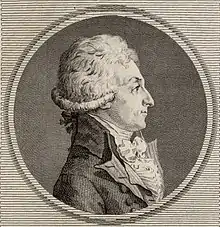Samuel de Missy
Samuel de Missy (Samuel, Pierre, Joseph, David de Missy or Demissy, 30 October 1755 – 20 October 1820) was a French trader and businessman, from the city of La Rochelle, where he was born. He enriched himself by selling clothes to slaving expeditions setting off for islands such as Saint-Domingue, where La Rochelle armateurs owned plantations.[1]

Although a participant in and beneficiary of the slave trade, de Missy disputed the legitimacy of enslavement, and joined the "Société des amis des noirs" ("Society of the friends of the Blacks").[1] He was much attacked for his positions in his own city, and finally had to recant his abolitionist stance for fear of damaging the economy of the city.[1]
He became a representative at the Assemblée Nationale Constituante (Parliament, "National Constituent Assembly") in 1789.[2]
The slave trade of La Rochelle ended with the event of the French Revolution and the war with England in the 1790s, the last La Rochelle slave ship, the Saint-Jacques was captured in 1793 in the Gulf of Guinea.[1] In February 1794, the National Assembly legislated the Universal Emancipation decree, which effectively freed all colonial slaves.
The Collège Samuel de Missy in La Rochelle is named after him.